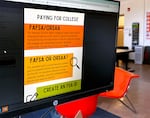Once a week, for three months, 17-year-old Daelyn Angulo logged onto the federal student aid website and tried to complete the Free Application for Federal Student Aid, or FAFSA.

A flyer informing Benson Polytechnic High School seniors about FAFSA, April 17, 2024. This year’s new FAFSA was intended to be simpler for students and their families to fill out, including students with undocumented parents. But it has so far been the opposite.
Tiffany Camhi / OPB
The high school senior knew submitting the form, which launched on Dec. 31, 2023, was the key to unlocking the financial aid she’d need to attend college.
But January passed and Angulo hadn’t successfully completed the FAFSA.
February flew by. Nothing.
Then March. No success again. Major scholarship deadlines were approaching — and she needed a completed FAFSA for them.
“I thought that I wasn’t going to get my FAFSA done,” Angulo said.
Angulo, a senior at Benson Polytechnic High School in Portland, wants to someday become a nurse in a neonatal intensive care unit. But without the FAFSA being completed, her dream of heading to Western Oregon University to study nursing was fading away.
“My family can’t put me through college out of pocket,” said Angulo. “It’s really important for me to get as much [aid] as I can so I can get the career and the life that I want for myself.”
Finally, on April 1, Angulo received an email from the U.S. Department of Education. It said her application was successfully submitted. The reason why it took three months to fill out, Angulo said, is because her mother does not have a social security number.
The Education Department’s bungled rollout of the new FAFSA has been challenging for many students and families in Oregon and across the country this year. But completing the application has been nearly impossible for many students from mixed-status families, in which different members of the family have different citizenship or immigration statuses. Multiple technical errors have barred students from these families from applying for months. Now some student and higher education advocates are worried these roadblocks are closing an important gateway to economic and social mobility for many immigrant families in the U.S.
Problems for mixed-status families compound
Angulo, who is Latinx, said she saw many of her white friends have little problem filling out the FAFSA. But peers who also had parents without social security numbers were all having the same problems as her: they could not finish the application.
“I thought FAFSA was racist,” said Angulo of the many times she tried filling out the form. “It was just so annoying how it didn’t let us through.”
In previous year’s FAFSAs, there was a workaround for students from mixed-status families. Students printed out paper applications, physically filled out the financial information for their parents and wrote in zeros where a social security number would go. They would then sign and send those applications to the Education Department in the mail.
The workaround required students to do more work than the online application. But it worked.
This year’s FAFSA is online only. When students tried to help parents with their portion of the application, error messages would pop up if the social security number was left blank. The online form would not let parents move forward in the process, essentially blocking students from finishing the application at all.
Alberto Plata-Hurtado, a youth engagement specialist with Latino Network’s college prep program Escalera, said applying to the FAFSA has always been a nightmare for the students he mentors. This year it’s impossible.
“It’s like a sequel to a movie where they make the first movie, then they try to make the second one and it’s even worse than the first,” said Plata-Hurtado.

Alberto Plata-Hurtado helps a Benson Polytechnic High School Escalera senior with his FAFSA on April 17, 2024. The Education Department rejected the student’s application due to a spelling error.
Tiffany Camhi / OPB
For months, students from mixed-status families were at a loss. High school, college and career counselors did not know how to help them. FAFSA call centers and online chat functions could not provide any real guidance either.
In February, congressional Democrats in Oregon joined dozens of other lawmakers who signed a letter calling on the U.S. Education Secretary Miguel Cardona to quickly resolve issues involving mixed-status families. Later that month, the Education Department released a temporary fix to the problem: a nine-step process that would allow students to get further in the application but ultimately still not able to complete it. Student advocates said this revision only made the process more time-consuming and confusing.
The federal government made several more corrections to this problem last month. After these fixes, undocumented parents could check a box that stated they did not have a social security number. They would then be directed to fill out and send a separate identity verification form to the Education Department.
But even with these patches, some students from mixed-status families are still having trouble completing the FAFSA.
FAFSA problems put higher education opportunities at risk
Plata-Hurtado works hard to make sure the students he mentors in Benson’s Escalera program have a good chance of making it to college. He checks on their grade point averages, supports them if they’re experiencing issues in their social or family life and he helps them apply for financial aid.
In past years, Plata-Hurtado has been able to make sure every one of his students has completed the FAFSA by now. But this year only seven of the 20 seniors he mentors have been able to successfully complete the application, a rate that closely mirrors the lower-than-usual statewide FAFSA completion percentage of 38%.
“In years before, by this time, everybody was done with it,” said Plata-Hurtado. “Even if they were undecided as to where they wanted to go to college, at least the FAFSA was done and we didn’t have to worry about it.”
Plata-Hurtado was a first-generation college student himself and has firsthand experience with how higher education can transform and uplift immigrant families. Plata-Hurtado says many immigrant families rely on their children for support. And they see college as a gateway to economic stability.
“A lot of my students have that pressure to go to college or go to a trade school,” said Plata-Hurtado. “But in order to do that, they need financial aid. And in order to get financial aid, we need to submit the FAFSA.”
But even with these family pressures, Plata-Hurtado says morale around getting a higher education among his students has been severely eroded by all the problems with this year’s FAFSA. Many students don’t see how going through the trouble of applying for federal aid is worth it.
Plata-Hurtado says some families he’s worked with feel they are being discriminated against.
Students pressed to persevere through difficult process
With just two months of high school left and college enrollment deadlines looming, college career counselors and admissions staff at universities and colleges are scrambling to make sure these students aren’t left behind.

Graduation stoles from past Benson Polytechnic High School Escalera cohorts hang in Alberto Plata-Hurtado’s office space on April 17, 2024. Many of Plata-Hurtado’s students have had trouble filling out the FAFSA.
Tiffany Camhi / OPB
Western Oregon University is an emerging Hispanic Serving Institution in Oregon, and the school has implemented several initiatives to help boost FAFSA completion among the Latinx community, said WOU Admissions Director Jamiere Abney.
WOU has held FAFSA nights, which offer one-on-one application clinics, on campus and at local schools. Some workshops have been in Spanish and the school employs a bilingual Spanish financial aid navigator.
“There is an understanding that Latinx immigrant families are a huge part of our campus community,” said Abney.
Abney also said he’s had to change his pitch to students and families this year that have become wary of going to college due to this year’s FAFSA rollout. He has found himself talking more about the value of higher education this year than in years past.
“The question about going to college continues to be so much up in the air and people question the value of a college education,” said Abney. “This rollout just gives them another reason to say, ‘Well, I don’t really trust the system.’”
And while it’s always been the responsibility of students and parents to fill out the FAFSA, the challenges have created an even bigger undue burden for mixed-status families this year.
The advice they’re getting? Keep trying.
”There’s a level of, can you be persistent?” said Abney. “Can you be resilient in some of the process even though it is annoying and very frustrating.”
Resilience is what got Angulo through.
Now she’s waiting for WOU to send her a financial aid package, which will be delayed until at least next month, according to Abney. Angulo is hoping she’ll receive enough money from grants and scholarships to cover the full cost of attending the school. With enough financial aid, Angulo will be the first person in her family to pursue a higher education.
And, Angulo jokingly said, the Education Department could maybe throw in a few extra dollars for students like her who had to go through so much strife to complete this year’s FAFSA.
”The amount of stress they caused was so frustrating,” said Angulo. “We need more money from the stress because it’s been crazy.”
